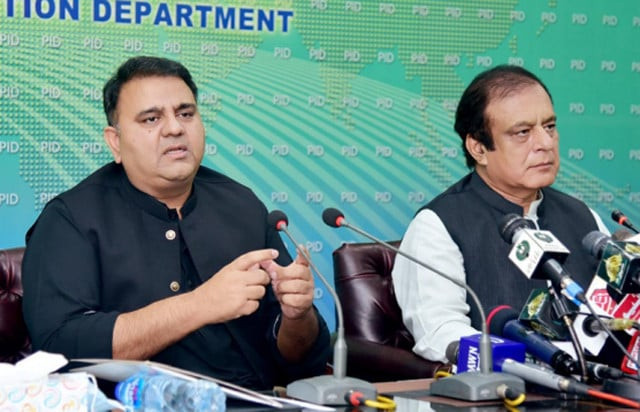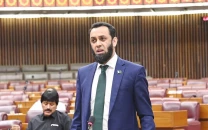ECP members should ‘review CEC’s decision’
Govt says there’s no option but to hold next polls with electoral reforms

Federal Minister for Information and Broadcasting Fawad Chaudhry has said that two members of the Election Commission of Pakistan (ECP) who will be nominated soon should review the decisions of the chief election commissioner as he is apparently speaking the language of the opposition on government reforms, specifically the electronic voting machines (EVMs).
“The ECP made unreasonable observations about EVMs without thoroughly examining it, reflecting its lack of seriousness towards adopting technology for ensuring transparent elections,” Federal Information Minister Fawad Chaudhry said at a news conference in Islamabad accompanied by Science and Technology Minister Shibli Faraz.
LIVE #APPNews : Federal Minister for Information and Broadcasting @fawadchaudhry
— APP 🇵🇰 (@appcsocialmedia) September 19, 2021
and Minister for Science and Technology Senator @shiblifaraz addressing press conference #Islamabad.
https://t.co/PBWLhUsizy
The minister said it was not possible for the government to hold the next general elections without the introduction of its electoral reforms agenda.
“There is no other way. The government wants to take the opposition into confidence on electoral reforms. It is the only option.”
However, he added, if the opposition refused to move beyond the cases against it then the government “would be forced” to move ahead with its plan.
Read NADRA chief orders probe into letter sent to ECP
The government, he claimed, could not leave the agenda for the 2028 general elections. “The 2023 general elections will only be possible after reforms.”
He said the ECP and the CEC were different than each other. “The government has strong reservations on the conduct of the CEC. Similarly, he added, the opposition should shun its “narrow-minded” approach and think in the larger national interest.
He said the government had given 49 proposals for reforms and the opposition was neither accepting them, nor bringing their own suggestions.
Fawad said the CEC had seemingly decided against using the EVMs without even considering the arguments in their favour.
“All the supporting arguments in the favour of EVMs were taken out of the ECP report submitted to the Senate Standing Committee on Parliamentary Affairs,” he maintained.
He further said the data of the elections in Philippines, Estonia and the Dominican Republic was removed from the report that showed that after introduction of EVMs, controversies in the results in those countries were reduced.
Fawad said in the 2007 elections in Philippines, which were held under the old paper system, the results were compiled after several days. Whereas in 2010 and 2019 elections held through EVMs, the results were declared within hours.
“The people’s trust in the 2007 elections in the Philippines was 35%, while they expressed 75% and 89% satisfaction over results of the 2010 and 2019 polls respectively.”
The minister reiterated the question about the CEC Sikandar Sultan Raja’s “impartiality” and repeated that he was “speaking the language of the opposition”.
“The chief election commissioner should distance himself from controversial matters as it was requirement of his post, otherwise he should quit and join politics.”
Fawad said a few opposition leaders had met with National Assembly Speaker Asad Qaiser, who had tried to clarify their misconceptions about the use of EVMs.
He added that the government wanted the speaker's committee to become functional and the opposition should play its positive role about reforms in the electoral process.
The minister maintained that it was the responsibility of parliament to decide the process of conducting elections in the country and the ECP should respect its decision.
Read more Govt, ECP tension over rigging allegation refuses to go
“Parliament will decide whether or not the next elections would be held under the traditional voting system or through EVMs. He said a joint session of parliament would be summoned, adding that its decision would be final and binding.
He said the apex court had issued directives to the ECP to use technology in the Senate elections held in March this year but its orders were ignored.
Speaking on the occasion, Shibli said his ministry had prepared a prototype of an EVM and invited all the political parties, ECP and the public to examine it.
He noted that the ECP had raised a list of 37 reservations in its report, of which 27 were related to the incapacity of the commission itself to handle EVMs.
The remaining 10 observations were related to the technical side of EVMs including lack of ballot secrecy, lack of voter anonymity, lack of transparency, biasedness of machine, prone to hacking, reusability of technology and easy upgrading, lack of evidence in election disputes and technical challenges.
He maintained that the EVM prepared by his ministry had addressed all these issues too.
The remarks against the ECP came amid an ongoing debate on the use of EVMs in the next general elections.
The government is pushing for the use of the machines, while the opposition and the ECP have expressed their reservations on their use, citing their susceptibility to hacking among other issues.
The ECP has also issued notice to Fawad and Railways Minister Azam Swati over their harsh language against the election watchdog.
(With input from APP)



















COMMENTS
Comments are moderated and generally will be posted if they are on-topic and not abusive.
For more information, please see our Comments FAQ